By Suzza | https://beautyofmathematics.com/top-five-popular-posts/
Does Google have a brain?

As a mathematics blogger with an interest in science communications, I’ve observed that there aren’t many tutorials for SEO keyword research available. This is a serious gap that needs filling, especially as more scientists begin to understand the modern appeal of blogging. SEO is key in helping your blog get noticed and bringing traffic to your website.
Generally, SEO is the practice of optimizing the quantity and quality of traffic to your website by including content so that a search engine recognizes it. This is most often done through choosing one or more keywords and optimizing your content so that a search engine recognizes those words on your blog. The goal is not to overly use keywords, but create a balance of keywords and related phrases.
Read on to learn my “5 Practical Steps for Keyword Research and Strategy”, a self-taught, cost effective method to improve traffic to your website.
Starting with SEO Keyword Research and Strategy
Technically, yes. This is a crucial question to ask about Google as a search engine. Google Engineers refer to part of their algorithm as RankBrain, fundamentally changing how we perform SEO keyword research.

What does it mean that Google has a brain? I took a class back in the 2000s called Theory of Mind. It was one of the most useful classes that I have ever taken to understand the cognitive processes of the brain, combining philosophy, cognitive psychology and computer science. The main takeaway from this class was the research in machine learning, of which Google takes advantage of in its search engine tool. It is also where I first learned about Alan Turing and the Turing Test, which really intrigued me.
Google thinks in concepts. You have to move away from the thought that keyword research is about the words, and instead imagine the links under a topic form a neural network of thoughts. The search engine has a wide understanding of words and ideas that it references.
My best advice? Be human, understand your topic, and provide useful information to your audience in a relatable way.
5 Practical Steps for Keyword Research and Strategy
This guide is a hybrid method between keyword research and using information strategically. Since our search engine is a mind, our method for writing needs to flow in a way that Google understands what we mean.
Honestly – research and strategy is not a method likely to be endorsed by an SEO expert. However, this is a method that works, without the high costs of SEO optimization tools. As a testament, I currently have a top placement on Google’s first page for “mathematical cross stitch.”
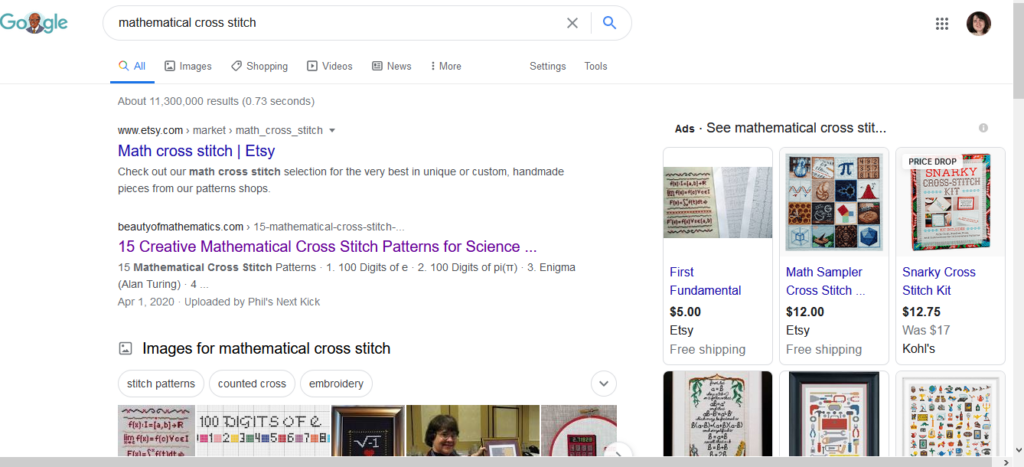
Commercial keywords optimization tools (many exist) can cost hundreds of dollars in monthly subscriptions. My method is free, but it does cost time. I would say 1-3 hours, depending on how deep you want to go and how hard the word you are trying to rank for is.
You’ll need:
- an internet connection
- a browser
- a spreadsheet
- a Keyword Density Tool (see Step 2)
Step 1: Setup your spreadsheet
I use Google Sheets. For this example, I’m using the topic “Science Communications Blogging”. First, I create two columns in my spreadsheet.
- Two-word keywords
- Three-word keywords
You may want space between the columns for an optional final step.
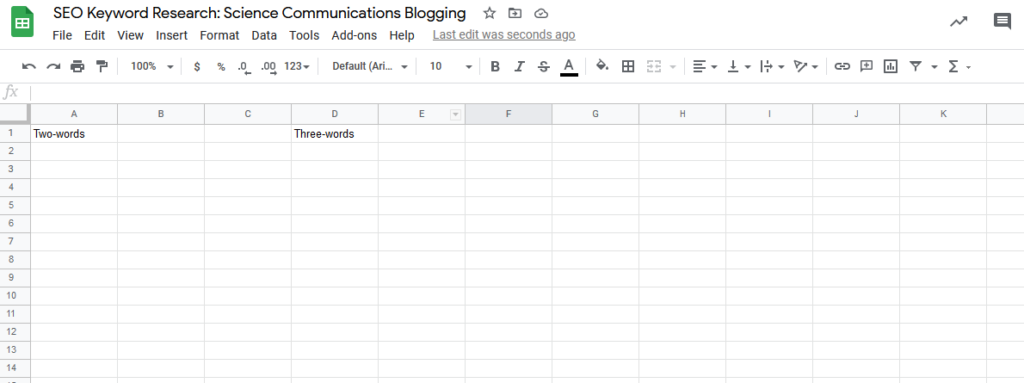
Step 2: Start Google research
We want to understand how Google thinks about science communications blogging and note the threads as we do our research. Think competitively. Some important questions to consider:
- What do these articles have in common?
- What are these articles missing?
- How can I improve what’s already available?
- Can I take a different approach?
You can then follow a content creation marketing method called 10x content, introduced by Rand Fishkin from Moz. Here’s a summary:
First, look up our keyword on Google Search.
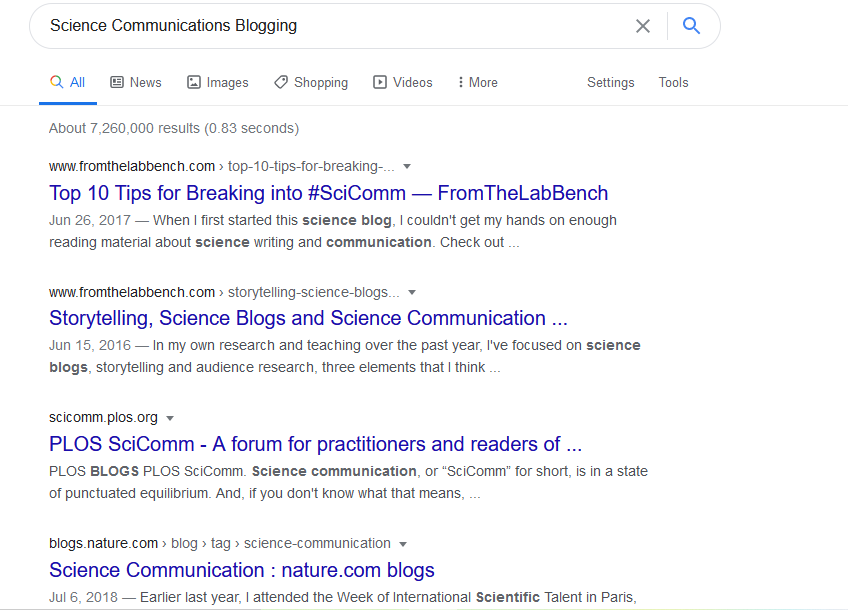
Look at that content. Sweet! Notice the top ranked content isn’t actually focused on science communications blogging, and is outdated. That’s two ways we can improve on what we write.
For this exercise, we’ll analyze the second link. Let’s throw that link into a keyword density checker. Here is a free one (located under SEO Content Tools).
Run the link through and copy down two-keyword and three-keyword findings in your spreadsheet. Order matters! Copy and paste the phrases exactly and treat variations as different keywords.
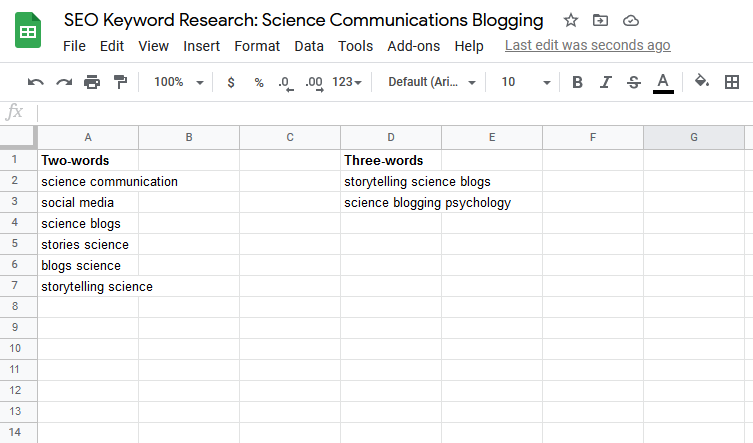
These are the words we want to include in our post to help it rank since top ranked posts are already using them! Interesting how we are seeing storytelling as a related phrase. This psychology angle might be good to add into our piece. It is unlikely to have much competition and might also help us rank.
Step 3: Repeat
We’ll use this process a few times to deep dive.
The first Google search on “Science Communications Blogging” I did was for “any time”, the default setting. I opened up all the links from the first three pages of the search engine results and ran them through the keyword density checker.
Did you know? You can restrict the time you look back. Click “tools” after you perform your search. The red circle (pictured below) is how you choose the time window.
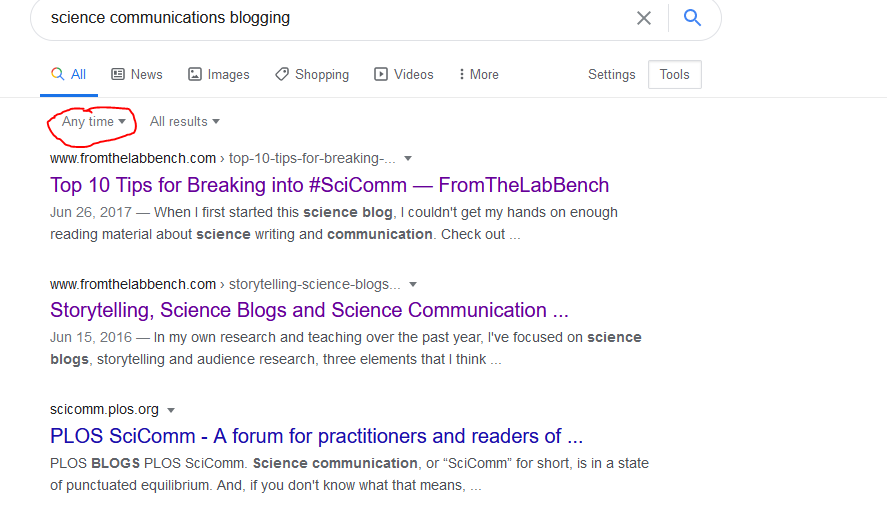
Repeat the Google search and density check restricting your search to the past year and then the past month. Skip any pre-visited links.
You may already have a feel for what should be included, which keywords are best, and the threads you can add to create a final informative piece.
Step 4: (Optional) Compare monthly search volumes
If you want clarity on popularity and competition for your keywords, you may want to try Google Keyword Planner (it’s free, too). You just need a Google Adwords account.
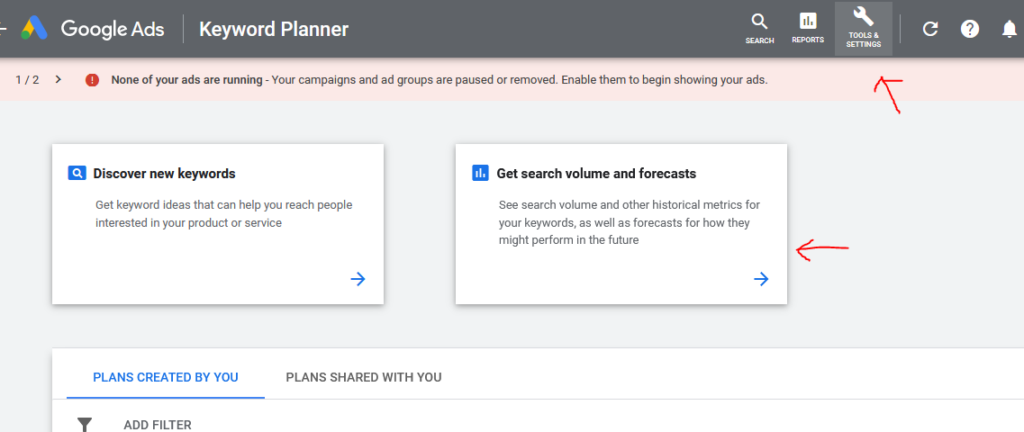
When you login, click on “Tools & Settings”. Next, select “Get search volume and forecasts.” Now, copy and paste the keywords generated in Steps 2 and 3 into the planner.
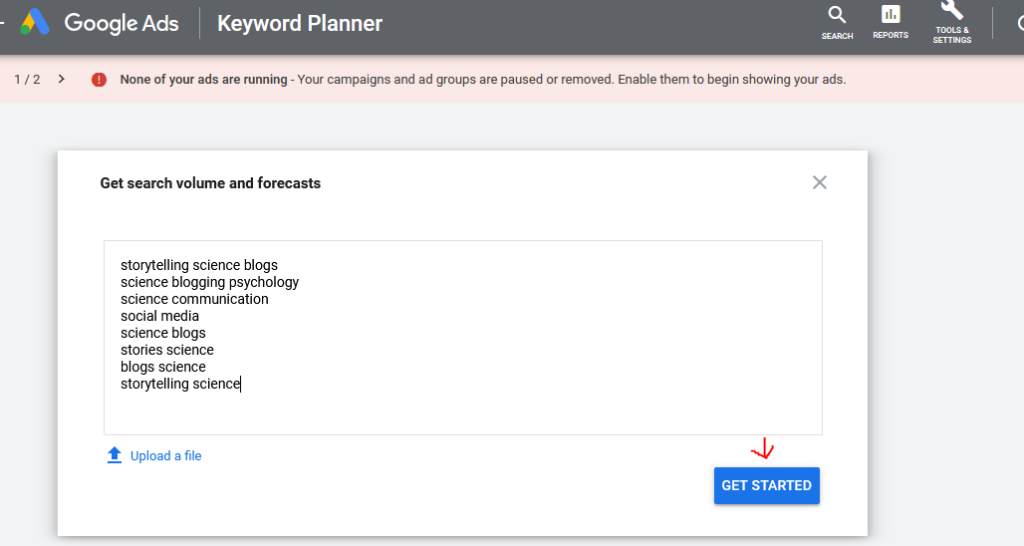
Click “Get Started” to find the monthly search volumes for all your keywords. Enter this into your spreadsheet, in the columns to the right of each keyword.
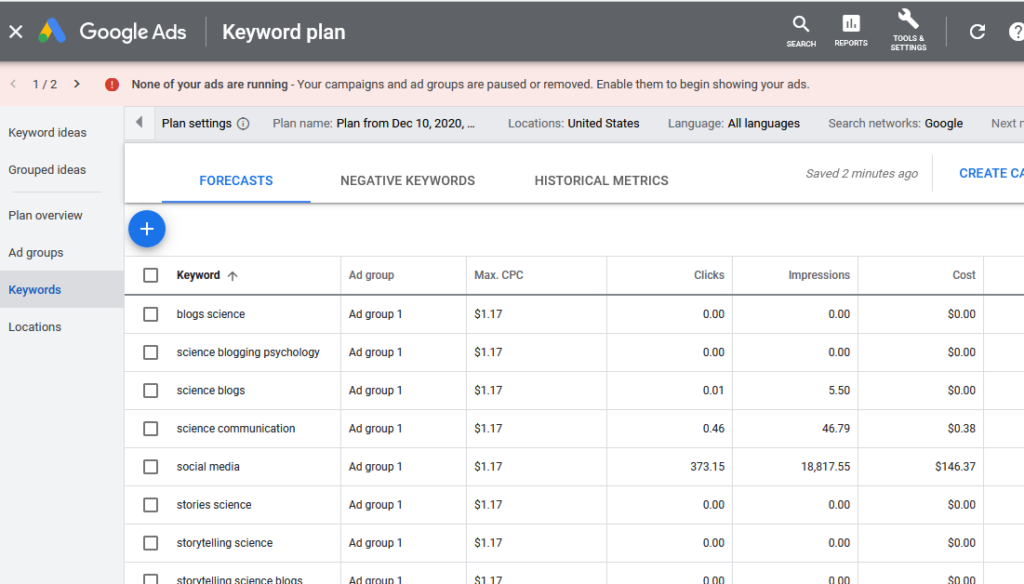
Let’s look at the three with the most impressions (appearances on any user’s screen). Social media isn’t relevant to our post, but you can see that it is a very popular topic and would be hard to compete for anyway.
“Science Communication” is a good keyword but that is an overarching topic. Include it, but it shouldn’t be your primary keyword. Consider this for all of your future topics.
“Science Blogs” looks like a good keyword to optimize for. We don’t need to worry that the number of impressions is low here since we are talking about a highly specific niche and competition should be low.
Use these keyword volumes to assess the popularity of your choices and the amount of competition. More volume means the keyword will be more competitive.
Step 5: (Optional) Look up related keywords
If you have more time, you can reference any keywords from your spreadsheet and do a deep dive with the same approach we used starting on Step 3 of this tutorial. You are bound to find a few keywords that are going to interest you more than others. I encourage following your curiosity.
Your SEO Keyword Research Practice
Do you already have a science communications blog? If you want to try this on an older post before diving into something brand new, try rewriting one of your previous blog entries using this process. Publish it and review it in a few months’ time to see the organic traffic you receive compared to your previous post. You can find traffic history in Google Analytics, if you have it.
For additional help, reference my guide with 107 resources for online science communication.
Did you learn anything from this blog post? If you decide to give this method a try, post your results! I’d love to hear about your experience.
Don’t forget the visuals! Other science blogging tips involve using appropriate language and expanding the definition of what it means to communicate science.



Really nice blog. Thank You very Much.